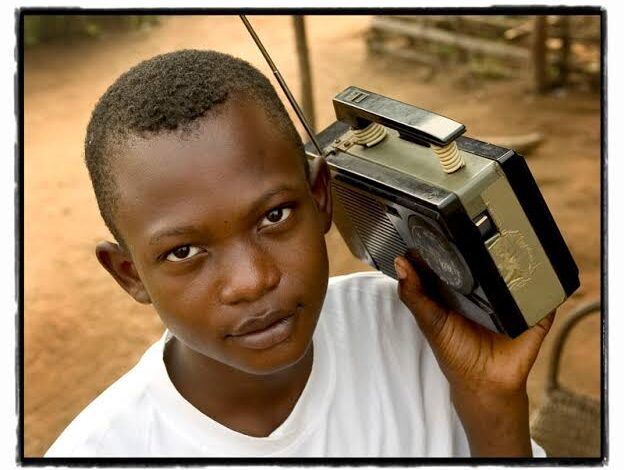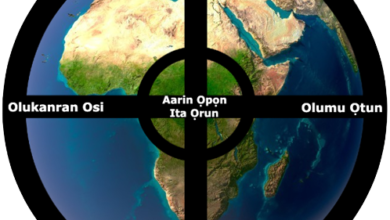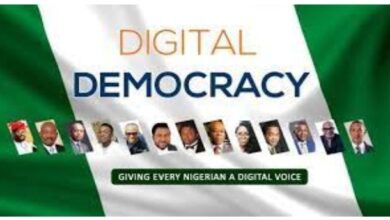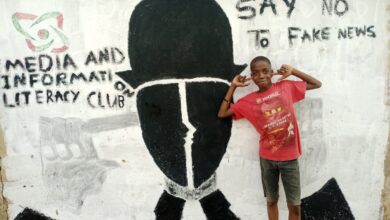
- Knowledge is power
- The Future Of Possible
- Hibs and Ross County fans on final
- Tip of the day: That man again
- Hibs and Ross County fans on final
- Spieth in danger of missing cut
By Ibraheem Muhammad Mustapha
Radio, with its widespread reach and unparalleled accessibility, continues to be a strong cornerstone of communication across the African continent. Its widespread reach and accessibility make it a lifeline for millions, linking urban areas to remote villages and bridging linguistic and cultural barriers. It has a significant impact on shaping public conversation, delivering vital information, and encouraging community engagement. However, as Africa navigates the complexity of a new digital age, there is a poignant reflection on radio’s historical role and trajectory, raising questions about its history and colonial echoes in the present.
Radio’s Colonial Roots
The history of radio in Africa is complex, with a heritage of propagandist exploitation by colonial powers and, later, by postcolonial regimes. Originally used as a weapon of control by colonial powers such as the United Kingdom and France, radio broadcasting in Africa gained traction during the turbulent time of World War II. Colonial authorities took advantage of the chance to expand their radio transmission activities, introducing indigenous language broadcasts in the 1940s to influence public opinion and rally support for the war effort. While the British broadcast to Africa in several African languages, France only broadcast in French. These broadcasts served a dual purpose: to disseminate propaganda that glorified colonial rule and to foster a sense of unity among colonial subjects.
However, these early transmissions paved the way for future advancements, influencing the course of radio broadcasting in postcolonial Africa. Though they have a documented history of liberation through radio and as a medium of social control, several African nations inherited a media landscape polluted by colonial propaganda after independence. For example, after Angola gained independence in 1975, radio was viewed as a weapon for nation-building. However, following a coup attempt in 1977, the government tightened its grip on the airwaves, strengthening official control over radio broadcasts. Similar patterns of state control can be observed in Zimbabwe, where the radio industry develops but is extensively impacted by government goals via biased licensing and restrictive rules for community radio stations. In Tanzania, the government employs undemocratic tactics to exert pressure on the media. History had it that Tanzania’s Broadcasting Commission in 1966, revoked radio and television licenses, and newspapers were banned from publication.
Furthermore, radio has been weaponized to promote evil political goals, as illustrated by the horrific events of Rwanda’s genocide in 1994. Radio Télévision Libre des Mille Collines (RTLM), a key media outlet for the Tutsi-led government, has become a textbook example of how radio may be used to spread hate speech and encourage violence against minority communities, such as the Tutsi people. RTLM, widely listened to by the general population in Rwanda, became a platform for projecting racist propaganda against Tutsis, moderate Hutus, Belgians, and the United Nations mission UNAMIR. Through its broadcasts, RTLM fueled climate of racial hostility and division, contributing to the escalation of violence that ultimately culminated in the genocide. The influence of RTLM on the events of the genocide is profound and deeply disturbing. A 2014 study published in the Quarterly Journal of Economics, titled “Propaganda and Conflict: Evidence from the Rwandan Genocide,” shed light on the extent of RTLM’s impact. The study estimated that the broadcasts of RTLM explained a significant increase in violence, resulting in approximately 45,000 Tutsi deaths, accounting for about 10% of the total death toll during the genocide. It also found that areas with full radio coverage saw an increase in the number of people prosecuted for any violence by about 62-69%.
Today, the colonial heritage of state broadcasting monopolies persists, albeit under the garb of ostensibly autonomous businesses in which the state intervened in policy, appointments, management, and programming decisions in the name of nation-building and development.
Radio’s Continued Relevance
Despite the growing prevalence of internet penetration across Africa, radio maintains its stronghold as the most sought-after medium of mass communication according to international reports. While the internet has made significant inroads in connecting people digitally, its reach remains limited compared to the pervasive influence of radio. It is estimated that no more than 570 million of the continent’s over 1.3 billion people have access to the internet. This figure underscores a significant digital divide, with internet penetration in Africa hovering between 30% and 43% as of 2022, still well below the global average of approximately 66%. Despite efforts to bridge this gap, challenges such as infrastructural limitations, affordability issues, and varying levels of digital literacy persist, hindering widespread internet access across the continent.
In contrast, radio continues to reign supreme as the primary source of news and entertainment for millions of Africans. Studies reveal that radio listeners account for a substantial portion of the continent’s population, ranging from 60% to 80% of its 1.4 billion inhabitants. Nigeria serves as a notable example, where the extensive use of radio as a key news source is evident. According to a 2015 survey by the Broadcasting Board of Governors, a staggering 77.4% of Nigerians, across all demographic groups, tune in to the radio for news at least once a week. Sierra Leone, the first West African country to transmit radio, is projected to have 81% radio access, compared to 45% for TV and only 13% for newspapers. 38% of the population has access to the internet via computers or mobile phones, with up to 65% in metropolitan areas. Additionally, a 2022 survey by Afrobarometer conducted across 34 African countries reaffirmed radio’s dominance as the “overwhelmingly most common source for news.”
The enduring popularity of radio can be attributed to several factors. Firstly, its accessibility and affordability make it a viable communication tool for both urban and rural populations, bridging geographic and socioeconomic divides. Unlike internet access, which often requires infrastructure and financial investment, radio transmissions can reach remote areas with limited connectivity and resources. Furthermore, radio’s versatility and adaptability ensure its relevance in diverse contexts and communities across Africa. Whether broadcasting in local languages or addressing specific cultural preferences, radio stations have a unique ability to tailor content to meet the needs and interests of their audiences. Moreover, radio’s resilience in the face of technological advancements underscores its enduring appeal. While the internet offers an array of digital platforms and multimedia experiences, radio’s simplicity and immediacy remain unparalleled. In regions with unreliable internet connectivity or limited access to digital devices, radio serves as a dependable lifeline for timely information and entertainment.
The Disinformation Dilemma
The accessibility and affordability of radio, coupled with its extensive reach across urban and rural areas, contribute to its enduring popularity among Africans. However, this widespread reliance on radio also presents challenges, particularly concerning the dissemination of misinformation. The pervasive influence of radio in shaping public opinion and disseminating information extends to critical moments such as election cycles, where its power to sway voters and manipulate political narratives becomes strikingly evident. Across many African countries, radio remains the primary source of information for voters, making it a potent tool for political manipulation during elections. Recent electoral processes have been marred by instances of biased coverage, false rumors, and incitement to violence propagated by radio stations, all serving the agendas of political actors. This phenomenon is vividly captured by Hassan Idayat in her research on the dissemination of disinformation during political and electoral processes in Nigeria.
“On radio and TV broadcasts, political consultants, often referred to as “soldiers of mouth” (or “Sojojin Baci” in Hausa), spread a mixture of truth and falsehood in favor of their political party”.
Furthermore, the recent event at VOP 90.3fm, a Nigeria-based radio station, exemplifies how radio may spread misinformation and skew public discourse. An anchor of one of the station’s programs in a viral video circulating on social media alleges that former Head of State, General Ibrahim Badamasi Babangida (IBB) has warned of a potential military takeover if President Tinubu is not cautious. Babangida quickly debunked the allegations through his media consultant, who emphasised his dedication to democracy and democratic processes. “He firmly believes that democracy is the superior form of governance and that electoral processes are the legitimate means for changing a government or expressing dissatisfaction or support,” the consultant emphasized. The radio station, in a letter dated February 16, 2024, apologised to the former President for allegedly alerting incumbent President Bola Tinubu of a probable military coup.
The claim, despite being swiftly refuted and even followed by a public apology both in writing and on air, has the potential to linger in the public consciousness, leaving a lasting impression that can shape perceptions and attitudes. The psychology behind this phenomenon is rooted in the way the human brain processes information. Catchy lies, often sensational and attention-grabbing, tend to create a more lasting imprint on individuals’ memories. In contrast, sober facts, though crucial for an accurate understanding of events, may not possess the same memorability factor. This cognitive bias poses a significant challenge in the battle against misinformation, as even retractions and clarifications may struggle to displace the initial catchy lie from the collective memory.
This enduring impact is vividly illustrated by the discourse unfolding in the comment section of YouTube videos (here, here, here, here and here), persisting even days after the misinformation was debunked. Released on February 19, 2024, just three days following the station’s retraction, a particular video has garnered significant attention, amassing 17,914 views, 355 likes, and 97 comments.
In the comment section of a video made to report the debunked statement, a user, exhibiting disappointment, erroneously attributes statements to Babangida, stating, “I’m very disappointed in Babangida’s statement; he made a serious mistake. Where was he in 8 years of Buhari’s administration that ruined Nigeria’s economy and security? We are waiting for the military to take over; you can advise them to take over next week and let’s see the miracle they will perform.”

Adding to the misinformation-fueled sentiments, another comment expresses support for the false claims, stating, “That’s what we want. The great Babangida.”

Even days after the misinformation is corrected, some comments continue to perpetuate false narratives, suggesting a disregard for verified information and an inclination towards politically charged and ethnic sentiments. One comment goes further to discuss historical events, blaming Babangida for past issues and advocating for regional separation.
“As a matter of fact, Babangida was supposed to be arrested and jailed, why didn’t he talk about the stolen mandate? When Buhari was there, he did not talk because his Fulani man was the president,” the commenter asserts.

“And mind you, the commenter continued, “do you people know the worst tragedy South West, South-South and South-East should pray that should not happen to us????? Tinubu should not die now, it’s better that he dissolves the so-called Nigeria and lets every region go separate ways, because why, if Tinubu dies, who is taking over again??? Shettima, Shettima, power back to the North, and that would be Shege, shege, shege,” the commenter further said.
These comments exemplify the potential for misinformation to not only persist but also to shape public opinion, contributing to the proliferation of divisive narratives and violent rhetoric.
Way Forward?
As Africa transitions into the digital age, radio’s dual nature becomes increasingly apparent. While it is still an important channel for information, shaping opinions and building togetherness, it is also vulnerable to misinformation and political manipulation. In this information age, Africa must balance the preservation of radio’s history with the pursuit of a better-informed future. Balancing colonial control’s legacy with the challenges of the digital age necessitates extensive media reforms, enhanced media literacy, and a commitment to transparency and accountability. Only then will radio in Africa continue to flourish as a reliable source of information for future generations.




Hi, this is a comment.
To get started with moderating, editing, and deleting comments, please visit the Comments screen in the dashboard.